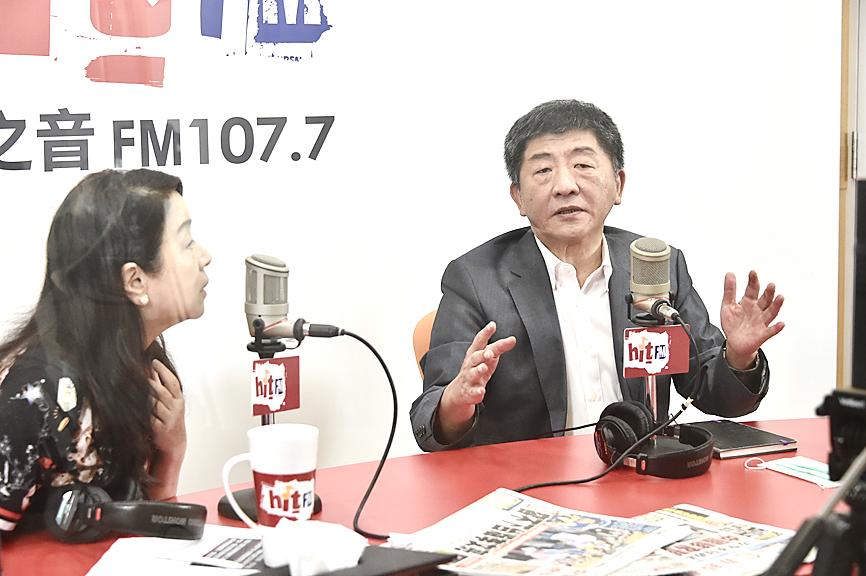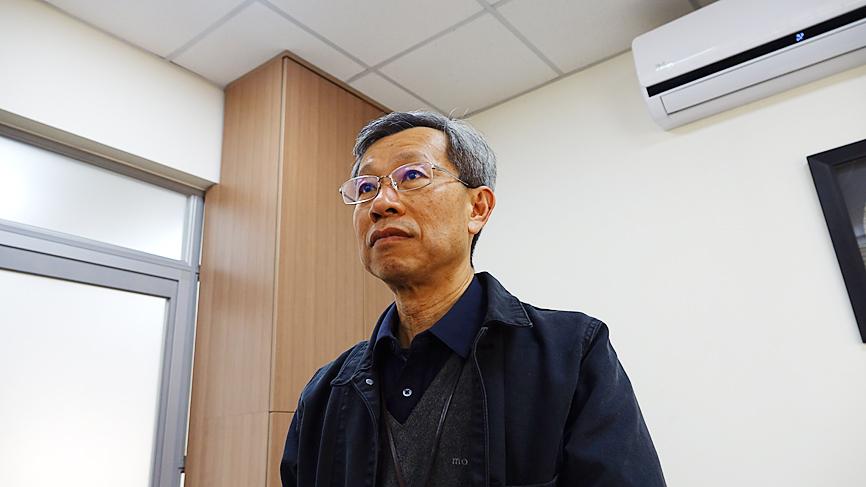President Tsai Ing-wen (蔡英文) yesterday lauded Minister of Health and Welfare Chen Shih-chung (陳時中) for his leadership of the Central Epidemic Command Center (CECC) in containing COVID-19, while the the Changhua County Public Health Bureau’s testing of a teenager who had shown no symptoms after returning from the US sparked debate and a Department of Civil Service Ethics investigation.
Taiwan’s achievements in containing the COVID-19 pandemic so far show that a democracy can tackle the challenge without concealing cases, Tsai wrote on Facebook.
As the global pandemic remains severe, the nation needs the CECC to continue making professional and timely decisions, she said, adding that Taiwan needs solidarity and mutual support.

Photo: Tu Chien-jung, Taipei Times
The center on Monday reported an imported case of COVID-19 — the nation’s 485th case — a Taiwanese teen who lives in the US and arrived on Aug. 5 for a family visit.
The teen had not shown any virus symptoms since his arrival, but on Saturday last week was tested by local health authorities, it said.
Asked why someone with no symptoms was tested, Centers for Disease Control (CDC) Deputy Director-General Chuang Jen-hsiang (莊人祥), the CECC’s spokesman, on Tuesday said that Chen has instructed the ministry’s Department of Civil Service Ethics to investigate.

Photo: Liu Hsiao-hsin, Taipei Times
The purpose of the probe is to clarify the facts, Chen said on Wednesday.
Reiterating his position during a radio interview yesterday, Chen said he understands Changhua Public Health Bureau Director Yeh Yen-po’s (葉彥伯) position that scientific evidence supports testing people who have no symptoms, but the Changhua bureau should have informed the CECC first.
Chen said the Changhua bureau had conducted virus tests for hundreds of people under quarantine over the past six months without informing the CECC.
Speaking at the Chinese Nationalist Party’s (KMT) headquarters in Taipei yesterday, KMT deputy secretary-general Lee Yen-hsiu (李彥秀) said attempts online to discredit the Changhua bureau have damaged the morale of the nation’s frontline healthcare workers.
If the local and central governments have a difference of opinion regarding the handling of COVID-19, or procedures, the CDC should communicate with local health departments to understand the situation, instead of using the Department of Civil Service Ethics, she said.
“If director Yeh had not done this, perhaps no one would have discovered this case,” she added.
Asked whether Chen’s order to investigate Yeh was excessive, Premier Su Tseng-chang (蘇貞昌) asked whether it was right for Yeh to order a person to break quarantine to be screened for COVID-19 and whether the move conformed to the CECC’s standard operating procedures.
Disease prevention efforts should be consistent from the central government down, he said, adding that the central government would back Chen’s decision.
Separately, Yeh said that when a person under quarantine needs to visit a hospital for COVID-19 testing, local health bureaus arrange a taxi or an ambulance for the person, as the central government only bans quarantined patients from taking public transportation.
If no taxis or ambulances are available, the person might need to drive to the hospital, while hospitals are asked to help keep track of their location, he said.
However, Yeh’s comments sparked debate over whether local testing procedures might differ from the CECC’s policies and create loopholes in disease prevention measures.
As Yeh also serves as chairman of the Taiwan Association of Medical Screening, some people question whether he tested the teen as part of promoting universal screening.
The association is irrelevant in this case, as it targets cancer and chronic diseases, Yeh said on Wednesday.
Yesterday, the CECC reaffirmed its policy of not adopting universal screening, as it rejected media reports that Taiwan plans to test all arrivals from 12 “high-risk” countries and regions.
The pandemic is still severe in many nations, so Taiwan pays close attention to the virus situation in “high-risk” countries and regions, and continues to weigh the feasibility of prevention measures against their effects, and weigh the threat of virus situations overseas against domestic disease prevention efforts, the center said.
However, there is currently “no specific plan” to test all arrivals, the center said, adding that any need for additional measures would be explained to the public.
Taiwan currently only tests all arrivals from the Philippines.
Additional reporting by Sean Lin and Chang Tsung-chiu

TRAGEDY STRIKES TAIPEI: The suspect died after falling off a building after he threw smoke grenades into Taipei Main Station and went on a killing spree in Zhongshan A 27-year-old suspect allegedly threw smoke grenades in Taipei Main Station and then proceeded to Zhongshan MRT Station in a random killing spree that resulted in the death of the suspect and two other civilians, and seven injured, including one in critical condition, as of press time last night. The suspect, identified as a man surnamed Chang Wen (張文), allegedly began the attack at Taipei Main Station, the Taipei Fire Department said, adding that it received a report at 5:24pm that smoke grenades had been thrown in the station. One man in his 50s was rushed to hospital after a cardiac arrest

A car bomb killed a senior Russian general in southern Moscow yesterday morning, the latest high-profile army figure to be blown up in a blast that came just hours after Russian and Ukrainian delegates held separate talks in Miami on a plan to end the war. Kyiv has not commented on the incident, but Russian investigators said they were probing whether the blast was “linked” to “Ukrainian special forces.” The attack was similar to other assassinations of generals and pro-war figures that have either been claimed, or are widely believed to have been orchestrated, by Ukraine. Russian Lieutenant General Fanil Sarvarov, 56, head

SAFETY FIRST: Double the number of police were deployed at the Taipei Marathon, while other cities released plans to bolster public event safety Authorities across Taiwan have stepped up security measures ahead of Christmas and New Year events, following a knife and smoke bomb attack in Taipei on Friday that left four people dead and 11 injured. In a bid to prevent potential copycat incidents, police deployments have been expanded for large gatherings, transport hubs, and other crowded public spaces, according to official statements from police and city authorities. Taipei Mayor Chiang Wan-an (蔣萬安) said the city has “comprehensively raised security readiness” in crowded areas, increased police deployments with armed officers, and intensified patrols during weekends and nighttime hours. For large-scale events, security checkpoints and explosives

PUBLIC SAFETY: The premier said that security would be tightened in transport hubs, while President Lai commended the public for their bravery The government is to deploy more police, including rapid response units, in crowded public areas to ensure a swift response to any threats, President William Lai (賴清德) said yesterday after a knife attack killed three people and injured 11 in Taipei the previous day. Lai made the remarks following a briefing by the National Police Agency on the progress of the investigation, saying that the attack underscored the importance of cooperation in public security between the central and local governments. The attack unfolded in the early evening on Friday around Taipei Main Station’s M7 exit and later near the Taipei MRT’s Zhongshan